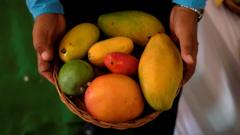For individuals managing diabetes, fruit consumption often comes with caveats, particularly for those high in natural sugars like mangoes. Conventional dietary advice frequently suggests limiting or avoiding such fruits due to their potential impact on blood glucose levels. However, recent research emanating from India is presenting a nuanced perspective, suggesting that controlled integration of mangoes into a diabetic diet, specifically as a carbohydrate substitute, might offer unexpected benefits.
Two distinct clinical trials conducted in India have explored the effects of mango consumption in diabetic patients. The premise of these studies centers not on adding mangoes to an existing diet, but rather on substituting a portion of daily carbohydrate intake with the fruit. Initial findings indicate that when mangoes are consumed in place of other carbohydrate sources, participants demonstrated improvements in their blood sugar regulation. This challenges the long-held belief that mangoes are strictly off-limits for those with diabetes, implying that their glycemic impact may be mitigated when part of a carefully managed exchange of carbohydrates. The studies underscore the importance of portion control and dietary planning, highlighting that the context of fruit consumption within the overall carbohydrate load is crucial. While further extensive research is typically warranted, these preliminary results invite a reconsideration of dietary guidelines for diabetics concerning fruit intake, particularly in regions where mangoes are a staple.



